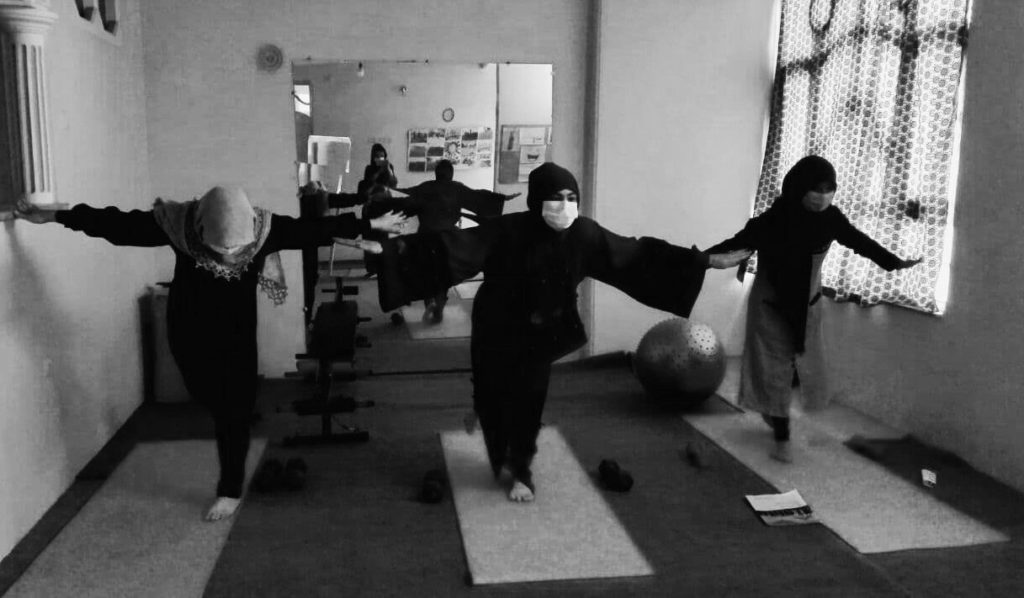One year since the Taliban took Afghanistan, some of the worst fears about human rights have come true, especially for women and girls.
But some key programs have found ways to keep functioning, thanks to the strength, resilience and courage of Afghan women and girls.
One such program is Free to Run, a global initiative supporting women’s leadership and running that had been operating in the country for eight years, before being forced to shut down following the Taliban takeover – burning documents and smashing computers in the process, in the interest of the safety of their most visible staff.
Led by women still in Afghanistan, they recently launched a new initiative – Omid, after Afghan women leaders reached out to their US colleagues requesting support and resources to launch an exercise program.
Omid, which is the Dari word for hope, is based on a guerrilla strategy of offering training to young women, via small-scale, indoor fitness sessions – enabling them to connect with other girls and women in their communities.
Operating every week since May, the program has seen young women participate in their training curriculum, before going on to train ten to 20 other women themselves. Free to Run describes it as a “quiet style of work”, the only way to stay off the Taliban’s radar. Piloted with the help of a women-led partner organisation that can help monitor security risks, the word is quietly spreading with more organisations reaching out for the training.
They do this in the face of sport now being strictly forbidden for women and girls, and the idea of running outdoors – or even walking without a male chaperone present – now simply impossible. The exercise programs are an opportunity to stay connecting to the running or other forms of exercise that had been gaining momentum among women in Afghanistan in the lead up to the Taliban takeover. They are also an opportunity to give women and girls access to exercise programs for the first time, and help prevent a generation from missing out on such vital knowledge and tools.
So dangerous is the very idea that such a program existed in the past, that some of Free to Run’s high profile participants and staff have had to flee Afghanistan. One such woman is Ayat, a 26-year-old who took up running at the age of 18 and then later started training for ultramarathons, becoming one of the first Afghans to complete an ultramarathon: the 155 mile, six-day run of China’s Gobi Desert. VICE reported this week that Ayat is in the United States, after initially receiving a six month visa in Mexico. She doesn’t know where she’ll eventually settle, but she’s still running.
Ayat was one of the two women initially selected by Free to Run to train for an ultramarathon. She told VICE she applied for the program because she “wanted to do something unique” and knew that no boy, girl, man or woman had achieved such feats in Afghanistan. Her story is depicted in the UK documentary, noting the challenges she experienced and her determination to bring honour to her country.
Free to Run was established by ultrarunner Stephanie Case, initially as a means to raise money for an Afghan women’s shelter. As she says in the documentary, she found the women she met “didn’t give a shit about the money I’d raised for the shelter.” Rather, they wanted to know about something else. “They wanted to know about the running, and how they could do it too.”
Free to Run spent eight years building up programs in Afghanistan prior to August 2021, before having to quickly destroy all evidence of their operations.
It’s the ban on women and girls playing sport — and effectively from exercising at all outside of the home — that often gets lost amongst the other horrors the Taliban has inflicted. Despite claiming things would be different and attempting to claim they would form a “legitimate” government, women and girls have been denied access to education, while rates of child and forced marriage have surged. Women are also now forced to wear a burqa in public, and permitted to only travel with a male chapperone. There has been a 75 per cent reduction in women’s employment, according to the Institute for Peace, while women’s health services have been mostly abolished around the country.
Stealth programs enabling women to exercise may get lost given everything else that has been taken from them. But the strength — mentally and physically — the hope, resilience and purpose such initiatives provide are significant.
Free to Run is aiming to raise US$55,000 to support one year of expenses for Omid.


